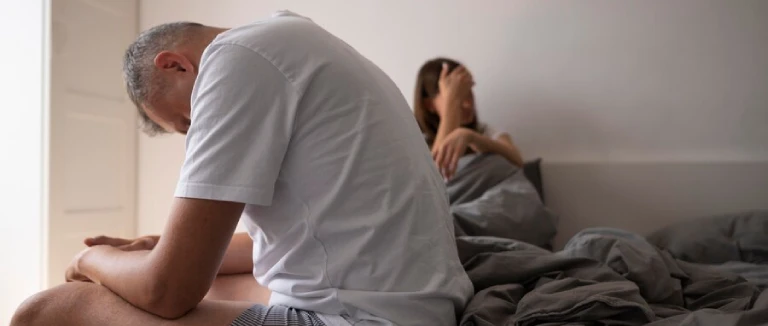Sexual Reluctance: Causes, Symptoms, and Treatment Options
Sexual reluctance is a condition that can affect any sexually active adult. While occasional changes in sexual desire are normal, persistent reluctance that significantly impacts one's sex life may indicate a more serious issue. Although it sometimes occurs without a clear cause, factors like hormonal imbalances can play a role. Therefore, it's important not to ignore ongoing sexual reluctance.
Sexual desire is the natural drive to engage in sexual activity. A healthy sex drive is often a sign of social, physical, mental, and emotional well-being. However, sexual desire can fluctuate and may be higher or lower due to various reasons. When desire drops to very low levels or disappears completely, this is referred to as sexual reluctance. This condition can affect individuals of any gender and may manifest as reduced interest or enjoyment in sexual activity, or even a strong aversion or unhappiness toward sexual thoughts and experiences.
In more severe cases, sexual reluctance can progress to hypoactive sexual desire disorder, where all sexual activities cease and desire is absent. This advanced form often develops if the initial reluctance is not addressed and persists over time.

What Causes Sexual Reluctance?
A decrease in sexual interest can result from various factors, including hormonal imbalances, aging, lifestyle choices, and stress. Certain health conditions, like diabetes, can damage blood vessels and nerves, reducing blood flow to the genitals and impairing sexual function”leading to lower desire. Similarly, heart disease can impact sexual activity in much the same way. In general, sexual reluctance can be caused by a combination of physical, psychological, and lifestyle factors in both men and women.
- Diabetes
- Osteoarthritis
- Cardiovascular diseases,
- High blood pressure
- Cancer
- Sleep apnea
- Antidepressant use
- Hormone medications
- High blood pressure medications
- Anxiety
- Depression
- Low self-esteem
- Alcohol
- Smoking
- Post-traumatic stress disorder
- Obesity
The causes of sexual reluctance can differ between men and women due to biological and hormonal differences. In men, a decrease in testosterone levels is a common reason for reduced sexual interest. For women, other factors play a significant role, such as vaginal dryness, pain during intercourse, difficulty reaching orgasm, premenstrual syndrome (PMS), menopause, pregnancy, childbirth, and breastfeeding.
- Vaginal dryness
- Painful sexual intercourse
- Difficulty reaching orgasm
- Premenstrual syndrome (PMS)
- Menopause
- Pregnancy
- Delivery
- Breastfeeding
What Causes Sexual Reluctance at a Young Age?
Sexual reluctance in young people can result from a variety of causes. In men, testosterone levels peak around age 18, typically leading to increased sexual desire. As testosterone decreases with age, reluctance may develop, especially after age 30. For women, sexual reluctance may become more common as menopause approaches and estrogen levels drop, usually after age 40. However, age-related factors like menopause are rarely responsible for sexual reluctance in younger individuals.
At a younger age, hormonal changes and psychological factors are especially influential. It is also natural for those who are new to sexuality to feel reluctant due to unfamiliarity, personal taboos, or anxieties. Common psychological contributors to sexual reluctance in youth include fears about sexuality, lack of experience, and evolving self-confidence. Hormonal shifts during puberty and young adulthood also play a significant role.
- Depression: People with depression may feel reluctant to do many activities. One of these activities is sexuality. Fatigue and lack of self-confidence that develop due to depression are also among the causes of sexual reluctance.
- Anxiety: A person's excessive anxiety is also one of the causes of sexual reluctance. Being afraid of sexual intercourse and exaggerating this situation in the person's inner world can cause anxiety and create reluctance.
- Lack of self-confidence: Lack of self-confidence, which is one of the problems experienced by many people at a young age, also closely affects sexuality. A person's lack of confidence, especially physically, can cause them to want to stay away from sexuality turning it into fear over time and experience reluctance.
- Sexual trauma: Negative experiences in the past or during the first sexual experiences may cause a person not to want to experience sexuality again. Serious traumas such as sexual harassment may also be among the causes of this condition.
Symptoms of Sexual Reluctance
People experiencing sexual reluctance often first notice a decline in sexual thoughts, which leads to decreased interest in sexuality and difficulty initiating or maintaining sexual activity. This can affect the enjoyment of relationships and may cause feelings of unhappiness or withdrawal, especially if triggered by past negative sexual experiences. In some cases, just thinking about sex can cause anxiety or panic.
For individuals with symptoms of sexual reluctance, it is important to seek a medical evaluation to identify the underlying cause. Doctors may ask about the duration and severity of symptoms and recommend hormone tests or physical exams to check for health problems.
While occasional sexual reluctance is normal, persistent issues that negatively impact life may require treatment. Identifying the root cause is essential. Psychological support, such as therapy, can be helpful”especially if reluctance stems from past trauma, stress, depression, or anxiety. Addressing these factors can often help restore healthy sexual desire.
What Should I Do To Increase Sexual Desire?
Making certain lifestyle changes can boost libido, especially when sexual reluctance is not related to underlying health issues. Increasing physical activity, practicing relaxation techniques, maintaining a healthy diet, and quitting alcohol and smoking can all support a healthier sex drive. Additionally, addressing relationship problems, fostering open communication with your partner, and introducing positive changes into your sex life can further enhance sexual desire.
If the person's sexual reluctance is at a serious level, hormone or drug treatments may be applied by the doctor. Hormone therapy is used to increase these levels, especially if low testosterone levels are present in men. At the same time, medications that help increase sexual desire can also be prescribed by doctors. Things that can be done to increase sexual desire include:
- Healthy communication with the partner
- Stress management
- Drug change
- Hormone therapy
- Psychotherapy
- Couples therapy
- Sexual therapy
- Healthy eating
- Kegel exercises
- Treatment and management of chronic diseases
- Getting back to a healthy weight in overweight and obese people
At the same time, some foods may have effects that increase sexual desire. Foods such as avocados, strawberries, watermelon, spinach are foods that can increase libido. But these nutrients should also not be consumed more than necessary.
* Liv Hospital Editorial Board has contributed to the publication of this content .
* Contents of this page is for informational purposes only. Please consult your doctor for diagnosis and treatment. The content of this page does not include information on medicinal health care at Liv Hospital .
For more information about our academic and training initiatives, visit Liv Hospital Academy
Frequently Asked Questions
What is sexual reluctance?
Sexual reluctance is a persistent loss of sexual desire that affects satisfaction and intimacy. It can result from hormonal, psychological, or medical factors.
What causes sexual reluctance?
Causes include hormonal imbalances, stress, chronic illness, medication, or emotional issues. In men, low testosterone is common; in women, hormonal or physical discomfort often plays a role.
Can young people experience it?
Yes. Anxiety, low confidence, emotional stress, or negative experiences can cause reluctance even at a young age.
What are the symptoms?
Low sexual interest, reduced satisfaction, or avoidance of intimacy are common signs. Some may also feel anxiety or emotional distance.
How is it treated?
Treatment may involve hormone therapy, psychotherapy, or couples counseling, depending on the cause. Addressing stress and medical issues is key.
How can desire be increased?
Healthy lifestyle habits, stress control, open communication, and regular exercise can boost libido.
Why choose Liv Hospital?
Liv Hospital offers expert hormonal and psychological care with personalized treatments to restore healthy sexual desire.


